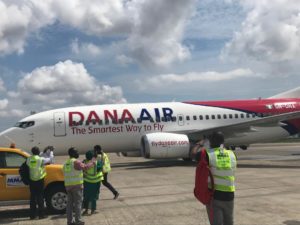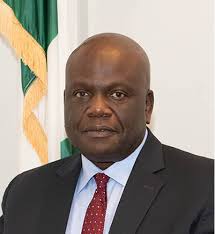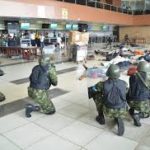
Aviation industry experts have called on the Federal Airport Authority of Nigeria (FAAN) to ensure continuous safety of the Nigerian airspace, having maintained zero accident for close to 10 years.
The industry experts made the call based on the recent signals from the aviation industry, which indicate that airlines and regulatory agencies are beginning to handle aviation safety with complacency.
They therefore called on the relevant authorities to brace up in order to ensure that air passengers continue to enjoy the good record of zero accident in the sector.
According to them, for almost ten years, Nigeria has maintained zero accident involving scheduled airlines. During the period, Nigeria recorded only three deaths involving helicopter accidents, which many considered as a very good safety record globally.
However, in the last two weeks there have been incidents that constituted safety breach that threaten Nigeria’s good record on safety and these are the presence of contaminated aviation fuel, which some airlines purchased and it ruined components of their engines.
The second incident is about the warning notice issued on Monday by the Nigeria Civil Aviation Authority (NCAA), alleging that domestic airlines overwrite the Cockpit Voice Recorder (CVR) of aircraft after serious incidents and accidents.
NCAA said airlines indulge in the unprofessional act in order to circumvent investigation by the Nigeria Safety Investigation Bureau (NSIB).
It went further to say, “This practice makes it practically impossible for the Nigerian Safety Investigation Bureau (NSIB) to retrieve actual data to aid in its investigation as required by Paragraphs 25 and 26 of the Civil Aviation (Investigation of Air Accidents and Incidents) Regulations 2019. This action has also impeded and posed undesirable difficulty in ensuring that NSIB successfully discharge its statutory mandate of investigating accidents and serious incidents.
“Unfortunately, this unwholesome practice has recently been detected in the industry. The Authority, by this AOL (letter), wishes to reiterate that Nig. CARS Part 7.8.1.3 (b), which is derived from the provisions of ICAO Annex 6, Section 11.6 states that, “To preserve flight recorder records, flight recorders shall be deactivated upon completion of flight time following an accident or incident. The flight recorders shall not be reactivated before their disposition as determined in accordance with the accident incident regulations of Nigeria.”
However, there are doubts that the flight crew may be able to erase or overwrite what is recorded in the CVR, but aviation expert, Sushil Bajpai, who writes for Quora, an online medium, argued that flight crew could erase recordings on CVR because it contains private recordings of the crew, which they may consider confidential. He however noted that flight crew may not have access to Cockpit Flight Data Recorder (DFDR).
“The flight crew quite obviously had serious concerns about violation of the private conservation between the crew. If there is no accident there is no need for anyone to hear the conversation between the flight crew. The erase switch was provided so that the crew could erase the conversation after normal landings.
“The DFDR on the other hand records hundreds of parameters over the last 200 hours or so and the investigators can reconstruct the entire flight. They can also replay the flight in flight simulators,” Bajpai said.
There have been allegations in the industry by stakeholders that complacency is setting in among airlines, but the Managing Director and CEO of Aero Contractors, Captain Ado Sanusi, disagreed and said that no airline in Nigeria could afford to have accident because what the airlines are selling is safety.
He said that the regulator may be approaching the issue of safety monitoring and oversight wrongly in the sense that it approaches the process in a punitive way, but ideally the regulator should investigate and if it finds anything wrong it disseminates information to warn other airlines so that they would not make the same mistake.
“Accidents are like chain reaction. The issue of effective oversight is to ensure that all the airlines are up to date with their processes and manuals and this is very important. Any accident that happens should not be approached in a punitive manner but should be made available so that other airlines can learn from it.

“There should be training and retraining for safety inspectors; so that when an inspector is assigned to an airline, he will have up to date knowledge of the aircraft types operated by that airline. So, training is very important,” Sanusi said.
On the ability of pilots to overwrite the CVR, he said that it was obvious that if pilots could do that, many would be tempted to do so, disclosing that in the US, the pilots association made it as a rule that before the CVR is played the pilot’s consent must be sought because there could be intimate discussions recorded in the device, which would not be for public consumption.
Sanusi assured that Nigerian carriers can never compromise safety standards because they would be the greatest losers if accident happens.
“What the airlines are selling is safety. It will be hard for any airline that gets involved in accident to come out of it. The situation can never be the same for the airline and it will take time before the airline will operate normally again if it ever comes out of it. If an airline circumnavigates the process it will pay more whenever it is caught.
“What is unique about aviation is that there are no fake aircraft parts; unlike the automobile. Each part must come with From 1 or its equivalent. I don’t think airlines can do anything to jeorpardise safety in their operation,” he said.
“We need total overhaul of the system. There should be effective oversight system and Nigeria will continue to enjoy accident free air transport. There has been significant improvement in air safety in Africa, in the world and this is because pilots and engineers undergo serious training, the aircraft has been improved on and it is largely automated and the air traffic control has also improved. Artificial intelligence has been introduced in air traffic control,” he said.
THISDAY






